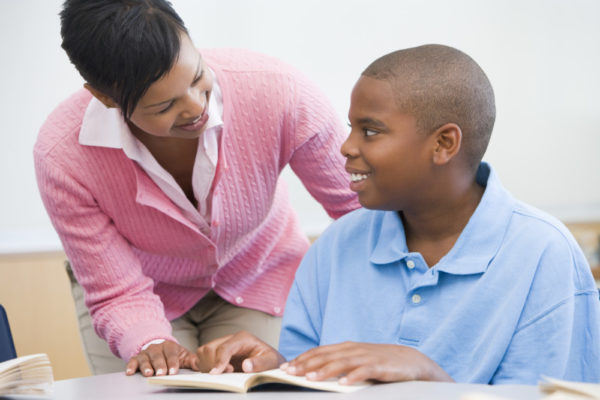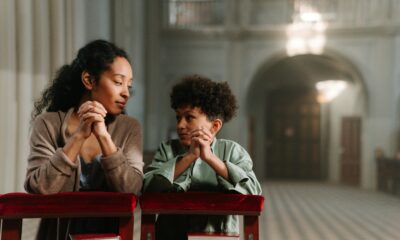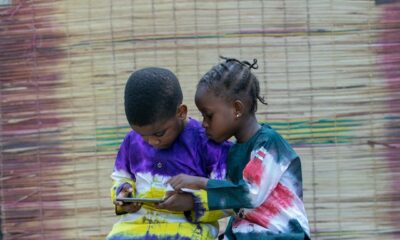Features
Love Without Boundaries with Bukola Ayinde: For Truly Inclusive Education, No Child Should Be Left Behind
 Inclusive education is no longer a strange word. Thankfully, more and more schools are now open to the idea. However, there are a few things you should know before admitting children with disabilities and special learning needs.
Inclusive education is no longer a strange word. Thankfully, more and more schools are now open to the idea. However, there are a few things you should know before admitting children with disabilities and special learning needs.
It is important to note that there is a difference between a child living with a disability and a child that has special educational needs. A child with any of these neurological disorders, autism, cerebral palsy, ADHD (Attention deficit hyperactivity disorder), Down Syndrome, may not have any form of special educational needs (which may include: learning disability or difficulty).
Special educational needs (SEN) is about education. While disability is about your body, your brain, your senses being wired and tapped in a unique way.
Taking it further, my daughter is 5 years old. She is unable to sit and stand unsupported. She cannot use her hands by herself and her speech is not very clear. This is because she has cerebral palsy. Cerebral palsy is a movement disorder which affects the part of the brain that controls the muscles.
In spite of these disabilities, she participates in class. She is doing very well with her academics; her tests are done orally. She even participated in her school’s Spelling Bee even though we had to be patient with her to go at her own pace in pronouncing the words.
What helped my daughter was locating a school that was willing and open to make adjustments by becoming more accommodating. Secondly, the presence of a learning support (an assistant teacher/nanny) in the classroom and the provision of a chair with support.
When she started schooling at the age of two, she was in toddlers’ class. The primary learning focus of this class is, learning alphabet sounds, numbers and nursery rhymes. At that age, this form of learning is basic for most children; with or without disability. Even though my daughter could not talk at that age nor did she show any form assimilation, yet years later she proved to us that she was assimilating everything going on in her environment.
That is one of the reasons I would suggest to parents of children with disability to enroll their children at an early age. I would also implore schools not to reject children with disabilities. Mainstream education is one of the many early intervention programs that can help children with disabilities to make progress.
Babies are born ready to learn, and their brains develop through use. A child needs a stimulating environment with lots of different activities that give her plenty of ways to play and learn, and lots of chances to practise what she’s learning.
Research has shown that the first five years of life (especially the first three years) are a period of incredible growth in all areas of a child’s development – the things the child sees, hears, touches, smells and tastes – stimulate their brain, creating millions of connections. Therefore, early intervention (which includes mainstream education) is critical for a child with developmental disabilities.
The second thing I would love to explain is the difference between intellectual disability, learning disorder, learning disability and learning difficulties. It is pertinent to note that on the Internet there are different definitions which may be confusing. However, if you follow the simple explanation below it will become much easier to understand.
An intellectual disability describes below-average IQ and a lack of skills needed for daily living. This condition used to be called ‘mental retardation.’ People with intellectual disabilities can and do learn new skills, but they learn them more slowly. There are varying degrees of intellectual disability, from mild to profound. (Please note that in the UK, intellectual disability is used interchangeably with learning disability. For the purpose of this article, they will be differentiated.)
Learning disability is an umbrella term for a wide variety of learning problems. Some people use learning disability and learning disorder interchangeably. I would rather say that learning disorder is a type of learning disability. An example of a learning disorder is dyslexia.
Dyslexia is a condition that makes it hard to learn to read or interpret words, letters, and other symbols. It happens when there is a problem with the way the brain processes graphic symbols.
The problem in dyslexia is a linguistic one, not a visual one. Dyslexia in no way stems from any lack of intelligence. People with severe dyslexia can be brilliant. Although it is a neurological condition, dyslexia is not linked to intelligence. It is not the result of poor teaching, instruction, or upbringing. They aren’t lazy or dumb. In fact, most are just as smart as everyone else. Their brains are simply wired differently. This difference affects how they receive and process information.
However, once you understand how to teach a child with this condition then learning becomes fun. Techniques usually involve tapping into the child’s senses, including touch, vision, and hearing. For example, you can activate such a child’s sense of touch by having her trace letters on a list of sight words with her fingers. The child may also cut the letters out on a sandy paper and have her trace the scratchy surface while saying out the letter names or the words. Have her write the word in the air with her pointer and middle finger and say it out loud.
A learning difficulty may simply mean that a child is not very good at a subject but with much effort, the right teacher, the right teaching method and constant practice this child can learn that subject to a good degree. A good example is my personal experience. I studied law because I just didn’t like numbers. However, the truth of the matter is that I have never truly dedicated enough time and effort to learn it. At the back of my mind I kept saying I don’t need it so I didn’t just bother to learn it.
In conclusion, having a physical or neurological disability is not synonymous with having an intellectual disability or a learning disability. Having a learning disorder or a learning disability doesn’t mean a child cannot go to school to learn with his or her peers. All that child may need is a different teaching method or assessment method.
Not having hands, e.g an amputee or not being able to use one’s hands, e.g. due to cerebral palsy or stroke doesn’t mean a child cannot go to school. My daughter’s case has taught me that no child should be left behind. All that may be needed is a little more patience in teaching and tests could be done orally.
A child with speech impairment can go to school, with a little patience, you can agree on other ways for this child to communicate his or her answers. As ridiculous as this may sound, if a child’s assessment is limited to ‘yes’ or ‘no’ the child may be required to blink or nod in a certain way to communicate his or her answer to a question.
Also remember that there are lots of assisted technology or simple communication boards that can help children with speech impairment. A communication board is a board with symbols or pictures that is used to facilitate communication for children with limited expressive language ability. Children communicate using the board by pointing and gesturing or gazing at the various symbols and pictures.
Indeed, if you have an open mind, you would always find a way to teach or reach out to that child in your classroom who needs a little extra help. With a heart of love, commitment and patience, no child would be left behind.
Photo Credit: Dreamstime






















